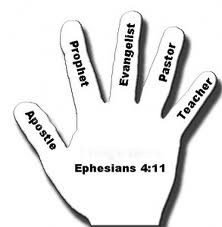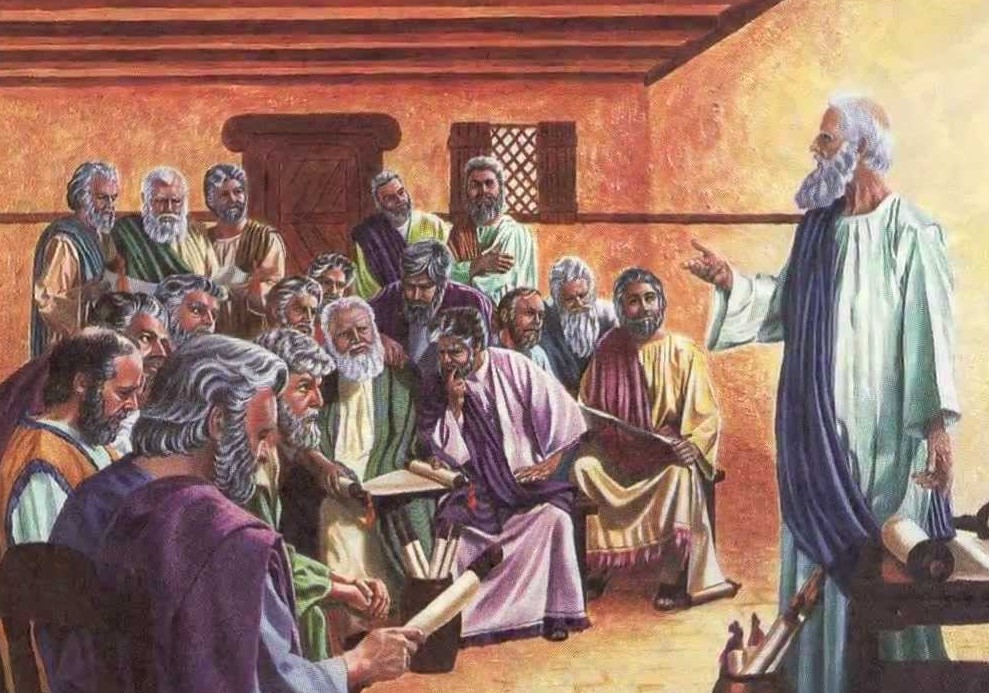
Did the so-called fivefold ministry offices cease after the New Testament era, or do they continue function in the body of Yeshua to this day? In our day, most people agree that the ministries of the evangelist, teacher and pastor are still in operation today, but many say that the offices of apostles and prophet have ceased to operate. Yet in verse 13, we read that these offices would operate “till we all come to the unity of the faith and of the knowledge of the Son of Elohim, to a perfect man, to the measure of the stature of the fullness of Messiah…,” which hasn’t happened yet. Therefore, it would stand to reason, that all these ministry offices are still needed today.
He. It must be kept in mind that Yeshua is the epitome of and over all (authoritatively) ministry offices that follow in this verse. When we ascended to heaven, he spread his own abilities out, as it were, among those he called to be leaders over his spiritual flock below (see Eph 4:8). Collectively, these ministry offices should be doing the work that Yeshua himself would be doing were he here on this earth presently.
Apostles. In addition to the twelve original apostles (including Matthias who replaced Judas Iscariot, Acts 1:26), here is a list of the other apostles, which might be called Yeshua’s ascension-gift apostles (Eph 4:8):
- James, the half brother of Jesus and leader of the Jerusalem church (Gal 1:19)
- Barnabas (Acts 14:14)
- Paul (e.g. Acts 14:14)
- Apollos (1 Cor 4:6–9)
- Timothy and Silvanus (1 Thess 1:1 and 2:6)
- Epaphroditus (Phil 2:25)
- Titus, and other un-named apostles—at least two (2 Cor 8:23)
- Andronicus and Junia (Rom 16:7)
- Yeshua is the Apostle and High Priest of our confession (Heb 3:1)
- Including Judas Iscariot, this makes a total of at least 26 apostles who are mentioned in the Testimony of Yeshua.
With this list in mind, it now becomes logical to divide the apostles into at least three categories or level. Yeshua is the Chief Apostle. The original 12 that Yeshua appointed (minus Judas Iscariot) and possibly Paul would be the next tier. They are the foundational apostles. Yeshua mentions that the 12 apostles will rule over the 12 tribes of Israel and that the 12 foundations of the New Jerusalem are named after the 12 apostles (Rev 21:14). It seems that Yeshua commissioned these foundational apostles in direct, face-to-face encounters. After this come the lowest tier or ascension-gift apostles (Eph 4:8), which are all the other apostles.
Apostle Defined
Apostolos means “a delegate, messenger, one sent forth with orders.” According to the Theological Dictionary of the New Testament, apostolos originally was a military or naval term relating to an expeditionary force that was sent out or dispatched. It came to be applied to a band of soldiers, or colonists and their settlement as well as to the commander of the expedition or an admiral. A common feature of all the definitions of the word was its passive character. In none of the definitions is there any suggestion of initiative on the part of the apostle. The word denotes the quality of being sent. In the New Testament, apostolos always denotes a man who is sent with full authority and is synonymous with the Hebrew word shaliach as is evidenced in John 13:16. Here is a legal term relating to one who is lawfully charged to represent the person and cause of another. This meaning is confirmed by the juxtaposition in this verse of the Greek wordsdoulos/kurios and apostolos/pemptsas. Here the servant (doulos) stands under full jurisdiction of his master (kurios) and derives from him all that he is. Apostolos also denotes the “commissioned representative of a congregation” (Acts 13:2ff). Finally, the term signifies the “bearers or proclaimers of the NT message.” The latter meaning applied to not only the original twelve apostles that Yeshua commissioned and sent out, but to the first Christian missionaries or their most prominent representatives (Acts 14:4, 14). According to Paul, the apostles (1 Cor 12:28f) aren’t officials of the congregation, nor the chief of such officials, but are officers of Yeshua by whom the church is built (ibid. vol 1, p. 407ff).
Attributes of an Apostolic Ministry
- Elohim sets or appoints (puts in place, establishes) apostles (as he also does prophets, teachers, etc., 1 Cor 12:28).
- An apostle is called by God, not men (Gal 1:1).
- They minister in the power of God, not the wisdom of men (Mark 16:20 cp. 1 Cor 2:1–5).
- Elohim appoints apostles by the revelation of the Holy Spirit and as confirmed by other established elders ( Acts 9:15; Acts 13:2-4; Acts 22:21).
- An apostle is given a specific mission to a specific group of people (Gal 2:8–9; Acts 13:2–4).
- They are spiritual pillars (Gal 2:9).
- They form part of the spiritual foundation of the church (along with prophets, Eph 2:20).
- They lay spiritual foundations for others to build on (1 Cor 3:10).
- They facilitate unity (along with the other five-fold ministries) within the body of Yeshua (Eph 4:11–13).
- They help the body of Yeshua to mature, to grow up, and to be built up (Eph 4:11–13).
- Apostles bring revelation to the church (Eph 3:5; Gal 1:11–12).
- Apostles establish, set, and correct doctrine (Acts 2:42; 15:19–30).
- They raise up new ministries and ordain elders (Rom 15:20; Acts 14:23).
- They impart spiritual gifts (Rom 1:11).
- They defend the gospel—are defenders of the faith (Phil 1:17).
- The apostles in the NT were persecuted and rejected or even killed for their service to the body of Yeshua (e.g. 1 Cor 4:11–13; Luke 11:49; Acts 5:18, 40). This is because they’re on the forefront of YHVH’s spiritual battle to advance his kingdom into the enemy’s territory.
- One has to grow into becoming a fully function and a spiritually powerful apostle. Yeshua’s 12 apostles asked him to increase their faith (Luke 17:5; Mark 16:15 cp. John 21:3 and Acts 2:14).
- An apostle may initially not be baptized in the Spirit, but once having received this spiritual empowerment will be released into the full authority of the office, as was the case with the original 12 apostles.
- Apostles take their marching orders directly from Yeshua (Acts 1:2).
- Apostles have authority to pronounce judgment on sinners within the body of Yeshua (Acts 5:3–10; 1 Cor 5:1–5).
- Apostles work many signs and wonders (Acts 5:12).
- Apostles lay down the doctrinal foundation within the body of Yeshua (Acts 2:42; 2 Pet 3:2).
- Apostles are often called to testify before secular and religious leaders (Acts 5:29).
- Often apostles have to stay in the thick of the spiritual battle while the rest of the saints escape from harm’s way (Acts 8:1).
- After the gospel is preached in an area, apostles are sent in to establish spiritual order and to plant congregations (Acts 8:14).
- Apostles go into new areas to preach the gospel (Acts 13:1–14:7).
- Apostles along with elders are called to help resolve conflicts within the body of Yeshua (Acts 15:2, 6).
There are false apostles (2 Cor 11:13; Rev 2:2).
He gave some to be …prophets. The Greek word prophetes translated as prophetsome 140 times in the NT and means “one who, moved by the Spirit of God and hence his organ or spokesman, solemnly declares to men what he has received by inspiration, especially concerning future events, and in particular such as relate to the cause and kingdom of God and to human salvation; of men filled with the Spirit of God, who by God’s authority and command in words of weight pleads the cause of God and urges salvation of men; in the religious assemblies of the Christians, they were moved by the Holy Spirit to speak, having power to instruct, comfort, encourage, rebuke, convict, and stimulate, their hearers.
According to the TDNT, prophetes as it relates to the primitive church was inspired speech of charismatic preachers through whom Elohim’s plan of salvation for the world and his will for the life of individual believers was made known. The prophet knows something of divine mysteries (1 Cor 13:2), about Elohim’s saving will for the Gentiles (Eph 3:5f), and one of his chief concerns is to declare imminent eschatological events (Rev 22:6f). He also knows other aspects of the future (Acts 11:28; 21:10f). The prophet speaks on contemporary issues as well relating to the ministry of the gospel (Acts 13:1ff; 1 Tim 1:18; 4:14), and edifies, comforts and exhorts the members of the body of Yeshua (1 Cor 14:3; Acts 15:32). Through his preaching, he brings to light the secret wickedness of men (1 Cor 14:25). Since he speaks with a sense of God-given authority, he gives authoritative instructions (ibid., vol. 6, p. 848).
He gave some to be …evangelists. An evangelist (Gr. yoo-ang-ghel-is-tace) by definition is a bringer of good tidings or news, or one who heralds of salvation through the Messiah and who were not apostles. It derives from the word euanggelidzo meaning “to preach the gospel, bring or declare good tidings or news. This word occurs only three times in the NT (Acts 21:8 of Philip; Eph 4:11 as listed among the other “fivefold” ministry offices; and in 2 Tim 4:5 of Timothy). The TDNT says that this term denotes a function more than an office. In the NT, it appears that all apostles were evangelists, but not all evangelists were apostles, and that former was subordinate to the latter. They are more than mere missionaries, since they preach in and lead congregations as well (2 Tim 4:2, 5; ibid., vol. 2., p. 736f).
Continue reading






